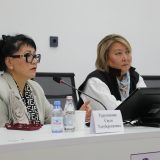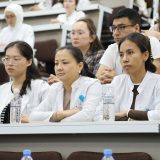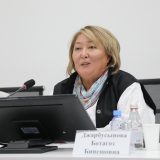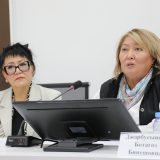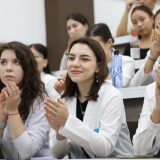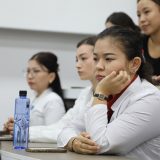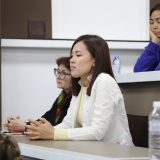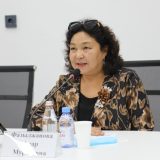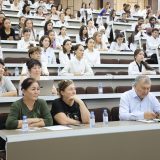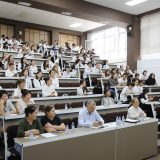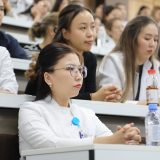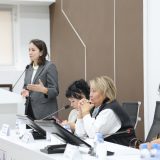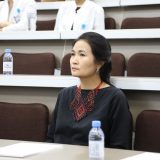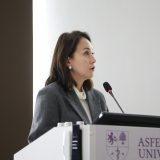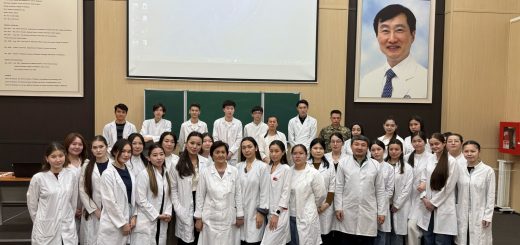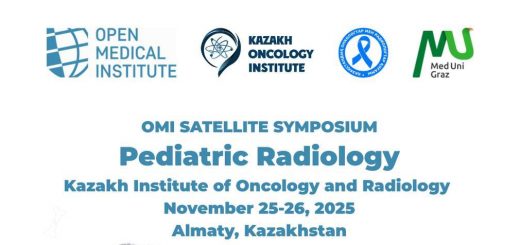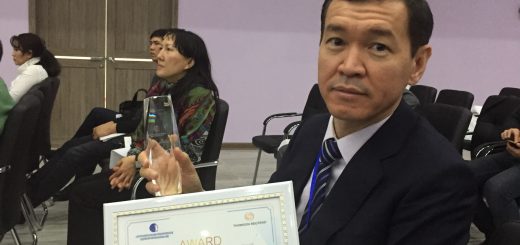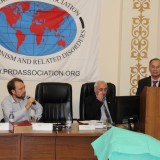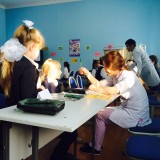Dementia and Alzheimer’s Disease Awareness Day
On September 30, 2025, at S.D. Asfendiyarov KazNMU, Dementia and Alzheimer’s Disease Awareness Day was held — an open educational meeting for relatives and caregivers, primary care doctors and nurses, students, and all interested parties.
The initiative of the Department of Neurologic diseases, which continued a series of educational events for practical healthcare dedicated to the 95th anniversary of KazNMU named after S.D. Asfendiyarov and the 90th anniversary of the memory of Professor S.K. Kaishibaev, was supported by the Department of Psychiatry and Narcology named after G.I. Zaltsman at KazNMU; the A. Baitursynov Institute of Linguistics; the Department of Communication Skills at KRMU; as well as the Kazakhstan Alliance on Dementia and Alzheimer’s Disease (KA&DA).
Relatives of patients, young people caring for the happy aging of their parents, neurologists, psychiatrists, and specialists from the A. Baitursynov Institute of Linguistics participated in this significant event.
Opening remarks were made by the meeting moderators Saule Tleubergenovna Turuspekova, Head of the Department of Neurologic diseases at KazNMU; Botagoz Bineshovna Dzharbusynova, Head of the Department of Psychiatry and Narcology named after G.I. Zaltsman at KazNMU; and Anar Muratovna Fazylzhanova, Director of the A. Baitursynov Institute of Linguistics.
The official part continued with a discussion of the global Alzheimer’s and Dementia Awareness Month as a worldwide campaign, presented by Paola Barbarino, CEO of ADI. This was followed by presentations, including:
- “Early Manifestations of Alzheimer’s Disease” — PhD Radmila Timsonovna Tsoi, Assistant Professor, Department of Neurologic diseases, KazNMU;
- “Dementia in Kazakhstan: Linguistic and Cultural Challenges” — Madina Abaeva, PhD in Philology, Head of the Psycholinguistics Department, A. Baitursynov Institute of Linguistics;
- “Communication Skills with Patients with Cognitive Impairments” — Galiya Baekenovna Kadrzhanova, Senior Lecturer, Department of Psychiatry and Narcology, Kazakhstan-Russian Medical University (KRMU); Aliya Rafikovna Smagulova, Senior Lecturer, Department of Psychiatry and Narcology, KRMU;
- “Mental Disorders in Dementia: Clinical Perspective and Treatment Approaches” — Lyudmila Yuryevna Bespalova, PhD, Associate Professor, Department of Psychiatry and Narcology named after G.I. Zaltsman, KazNMU;
- “Cognitive Impairments: A Psychiatrist’s Perspective” — Zhanar Dzhakhanshaevna Kaliyeva, PhD, Associate Professor, Department of Psychiatry and Narcology named after G.I. Zaltsman, KazNMU;
- “Activities of the KA&DA Foundation: Plans for the Future” — Nurmukhamed Karimzhanovich Mamashayev, Assistant, Department of Neurologic diseases.
The meeting was held in a warm, supportive atmosphere: the audience frequently applauded, participants shared personal stories, and speakers gave clear and practical advice. Many noted a sense of hope, involvement, and inspiration: “We left not only with handouts but also with the understanding that we are not alone and that together we can achieve more.”
“The linguistic environment and cultural codes influence how families notice and describe cognitive changes. This must be taken into account during screening and counseling,” noted Madina Abaeva, PhD in Philology and psycholinguist.
“The invitation of specialists from the Institute of Linguistics was an important step for us. We often stay immersed in the ‘medical bubble,’ but an interdisciplinary approach opens new topics and tools—from understandable screening language to culturally sensitive counseling for socially significant diseases,” emphasized PhD Radmila Tsoi, Assistant Professor, Department of Neurologic diseases, KazNMU.
An interdisciplinary platform will bring together specialists from primary health care, inpatient services, the academic community, and patient organizations to collaboratively address the challenges faced by families, neurologists, and psychiatrists — from early screening and diagnosis to the management of behavioral and psychological symptoms and support for caregivers. We observe a strong public interest in the topic of dementia — from the first symptoms to the ways families can be supported. Our priority is to translate up-to-date knowledge into primary care practice and to strengthen multidisciplinary collaboration.



